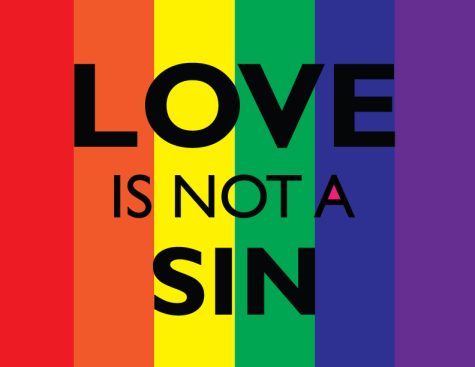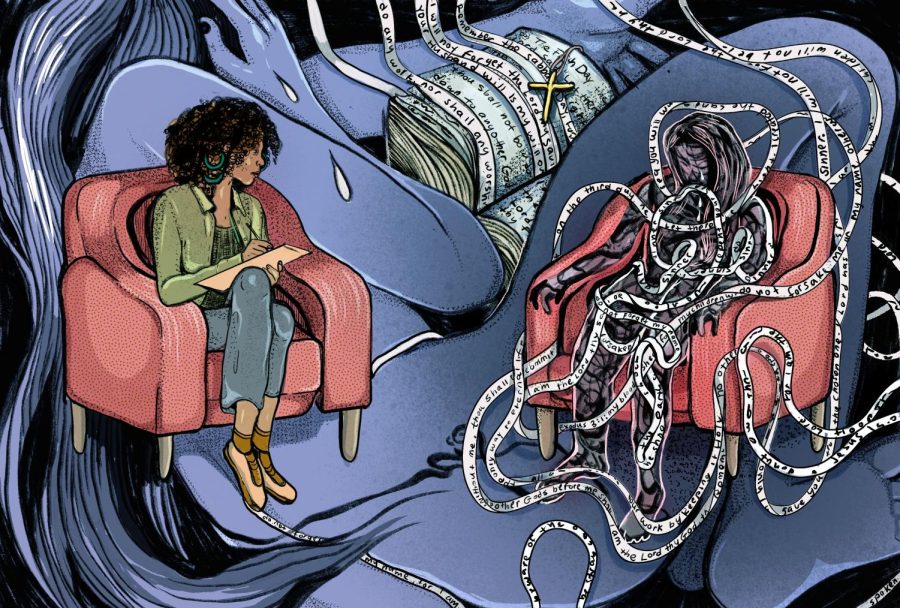Confronting Religious Trauma
https://www.google.com/search?q=religious+trauma&rlz=1C1AVFC_enUS869US869&source=lnms&tbm=isch&sa=X&ved=2ahUKEwiN8s-Hl9v2AhUxDkQIHeGOA-UQ_AUoAXoECAEQAw&biw=1536&bih=754&dpr=1.25&safe=active&ssui=on#imgrc=pq1EARE2ratfMM
April 6, 2022
Religion is the base of a lot of people’s lives. They surround their beliefs, lives, and actions. Some religions require their followers to go through stages, (ie. baptism, communion, and confirmation in Catholicism) or follow traditions according to the Bible (lent, ash Wednesday, Easter, among others). However, as much as some people feel stabilized by religion, some feel traumatic effects from it. Religious trauma is something that I feel is overlooked a lot of the time. It can make a person feel distressed and ostracized and can lead to low-self esteem, irrational beliefs, distrust of oneself, and feeling indebted to a group of people. Religious trauma can have a long-lasting effect on people, and sometimes they can’t rid themselves of it. It is caused by a variety of things, sometimes an isolated problem, and sometimes the problems stack on top of one another.
Religion is known to be a way to help those who feel ‘lost’ find their way. With the right people to lead you, it can give you stability and tranquility, peace of mind knowing that everything is as it should be, that there is a greater plan. That is how it has been explained to me for most of my life, and I tried to follow the faith. I tried and failed. I now know that religion just isn’t for me, and I don’t feel bad for it. But before, there was this sense of wrongness, and distress because everyone around me believed when I never could. Being reprimanded in the past when I expressed my doubt, being thought of as difficult and ungrateful because, “God gave you everything, that’s what you owe him in return.” The feeling sometimes carries, but there is a detachedness to it. Before it was suffocating, dramatic as it may sound. Hearing the story of Abraham, a man ready to sacrifice his beloved son for a God that he loved more had he not been stopped by an angle. Listening to people preach of loving thy neighbor, but turn their nose up at the phrase love is love, claiming a wrongness to it.

Being queer in a religious setting is not easy for a lot of people. Yes, there are the rare settings I’ve seen where the community is accepting and affirming of queer people, but more often than not there is hatred. Hatred is such a diverse thing, it can look several ways. It can be disguised as love, extended as false help, broken down to quiet contempt, or blown up to a horrible extent. The similarity of all forms is what they create in a person. Hate creates a sense of shame or anger directed on oneself. These feelings can often spiral to lead to mental illnesses, such as depression, anxiety, as well as other mental health problems. Hatred disguised as love or concern is an awful thing to be subjected to. It often happens when an authoritative figure in the church or community shows pity toward a queer person and treats them as if they have a disease that needs to be rid of. The person might offer help that leads the other further submerged in their self-hate because of their inability to rid themselves of their ‘wrongness.’
This cycle can also extend to victims and survivors of physical, sexual, and emotional abuse. It more often manifests in the form of false help. It is wrapped in pity and false love, and people who want to fix what – in their eyes – is broken. As for people who feel trapped in their faith, they can be made to feel a sense of guilt for wanting to leave. They, like everyone else above, can be shunned, dehumanized, and be made to feel wrong.
Religion can be a beautiful thing, a community of support, love, and faith that everyone’s life is on a road best suited to them. For others, it is a form of repression, wrapped in guilt and self-loathing, and wrongness. It’s a form of emotional abuse that isn’t all that well acknowledged.











